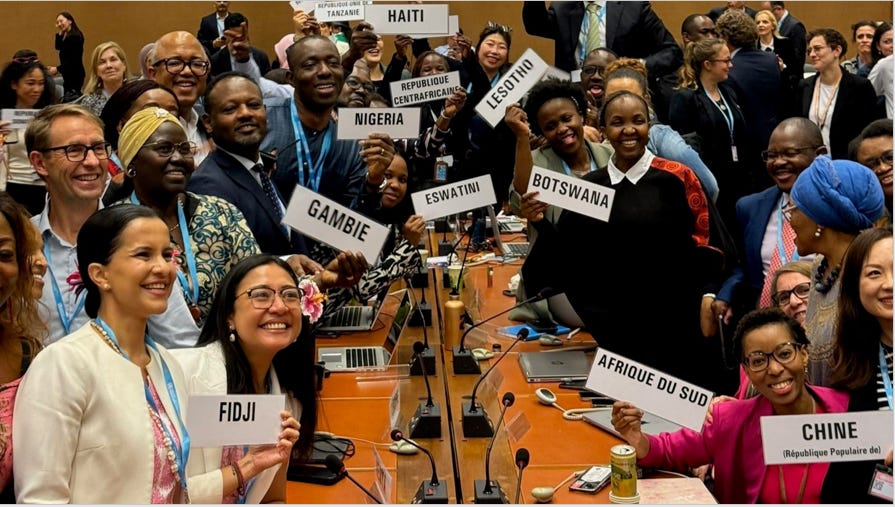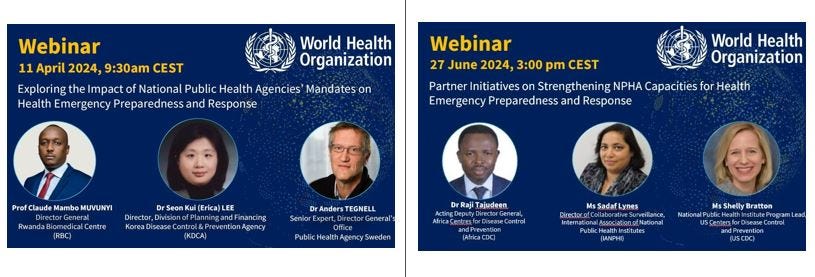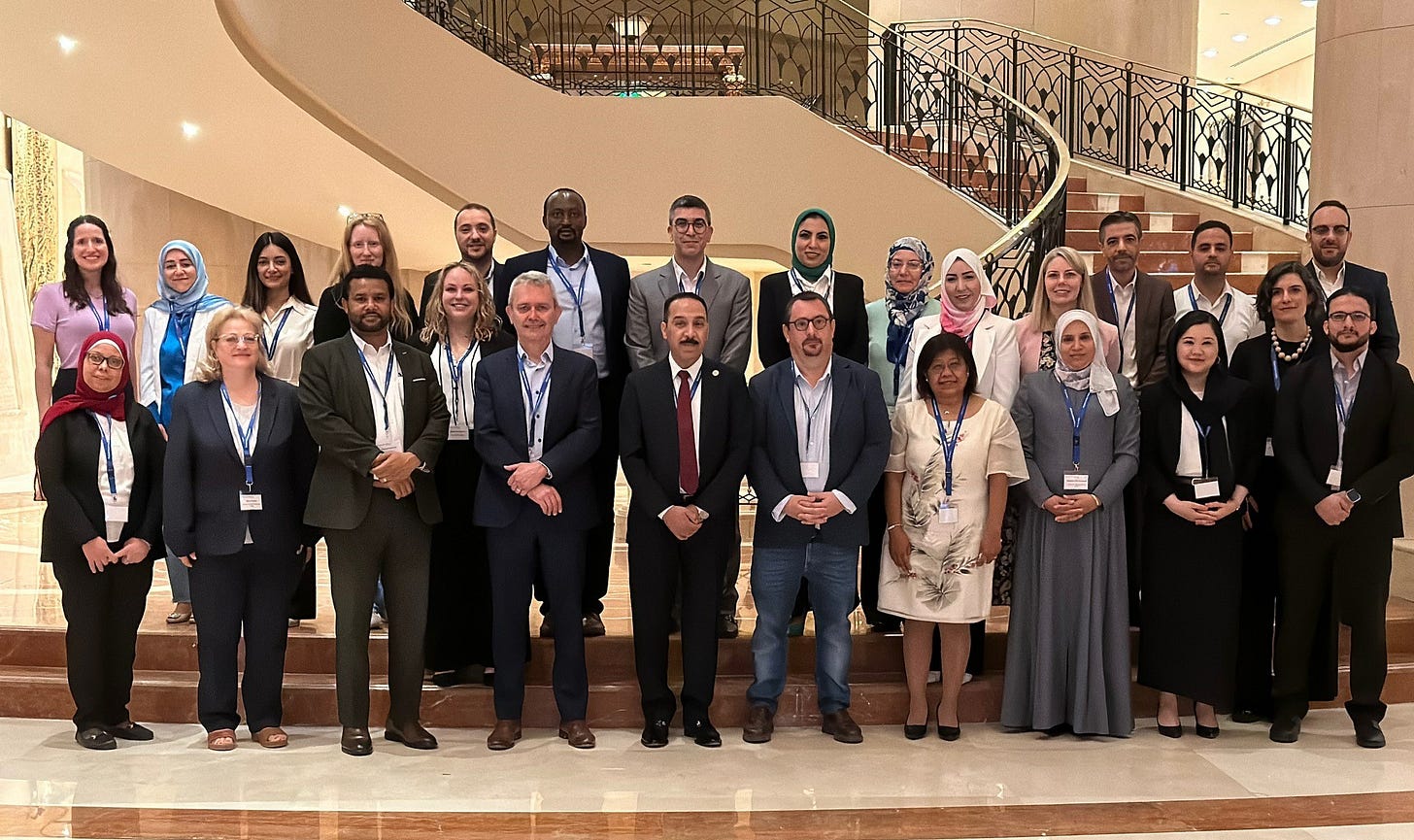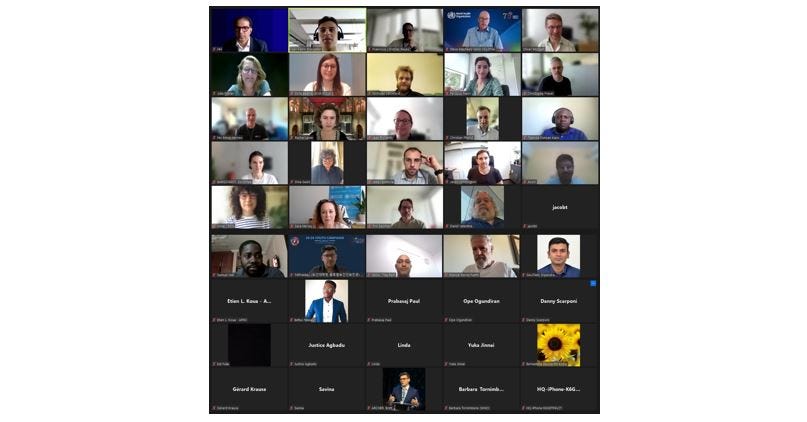It has been an action-packed second quarter of 2024 for the WHO Hub for Pandemic and Epidemic Intelligence (WHO Hub). In collaboration with our dedicated partners, we have hit significant milestones, advancing the global implementation of Collaborative Surveillance to new heights at both regional and country levels. We are grateful to our Member States and all our partners working with us on this.
Here is a selection of these highlights:
77th World Health Assembly: Historic Decision and Collective Commitment to Protect the World from Future Health Emergencies
Collaborative Surveillance Policy Makers Forum: Strengthening Country Leadership and Partnerships
Launch of the Research Prioritisation Policy Brief for Pandemic and Epidemic Intelligence
Launch of the Competencies for One Health Field Epidemiology (COHFE) Framework
Convening Global Actors for Advancing Collaborative Surveillance
WHO Health Emergencies Programme Initiative to Strengthen National Public Health Agencies
Collective Efforts to Enhance Public Health Intelligence at Country Level
Advancing Pandemic and Epidemic Intelligence in Brazil
Support for Go.Data’s Transition to An Open-Source Tool
10th Innovation Forum: Digital Twin Applications for Pandemic Intelligence
Read on for more details!
GLOBAL ENGAGEMENT AND PRIORITY SETTING
77th World Health Assembly: Historic Decision and Collective Commitment to Protect the World from Future Health Emergencies
In a historic achievement during the 77th World Health Assembly (WHA 77), WHO’s 194 Member States, agreed on a package of critical amendments to the International Health Regulations (2005) (IHR), and committed to completing negotiations on a global pandemic agreement within a year, at the latest. These essential actions have been implemented to ensure that comprehensive systems are established in all countries, safeguarding the health and safety of people everywhere from the risk of future outbreaks and pandemics.
© WHO
In alignment, Assistant Director-General Dr Chikwe Ihekweazu emphasised the need to support Member States to strengthen health emergency preparedness, response and resilience (HEPR), including the acceleration of the global implementation of Collaborative Surveillance.
During WHA 77, Dr Ihekweazu met with several Ministers of Health to explore how WHO can further support the strengthening of national health systems for health emergency preparedness and response. These included the Minister of Health of Australia, H.E. Mark Butler; the Federal Minister of Social Affairs, Health, Care and Consumer Protection of Austria, H.E. Johannes Rauch; the Minister of Health of Ethiopia, H.E. Dr Mekdes Daba; the Federal Minister of Health of Germany, H.E. Prof. Dr Karl Lauterbach; the Minister of Public Health of Lebanon, H.E. Dr Firass Abiad; the Minister of Health of Nigeria, H.E. Dr Muhammad Pate; the Minister of Health of Rwanda, H.E. Dr Sabin Nsanzimana; and the Minister of Public Health of Uruguay, H.E. Dr Karina Rando.
© WHO
Strengthening national public health agencies (NPHAs) remains a priority for the WHO Health Emergencies Programme. The team held bilateral discussions with several NPHAs, including the US Centers for Disease Control and Prevention (CDC), Fiocruz, the Korea Disease Control and Prevention Agency (KDCA), the Robert Koch Institute (RKI) and others to explore concrete pathways to strengthen their health emergency capacities.
The team also met with other global partners to align efforts and build strategic collaborations as we work to strengthen Collaborative Surveillance and cultivate the global public ecosystem. These included the Bill and Melinda Gates Foundation (BMGF), the Coalition for Epidemic Preparedness Innovations (CEPI), The Rockefeller Foundation, Wellcome, and the World Bank Group.
Collaborative Surveillance Policy Makers Forum: Strengthening Country Leadership and Partnerships
“Surveillance is about knowledge, and surveillance is about acting on that knowledge to make decisions for the protection and the welfare of the people we serve.”
Dr Mike Ryan, Deputy Director-General, WHO, and Executive Director, WHO Health Emergencies Programme
Collaborative Surveillance is one of the key components of strengthening the global architecture for HEPR. We have been working with and supporting Member States, regions, and partners to build an enabling environment to accelerate the implementation of Collaborative Surveillance worldwide. Our Collaborative Surveillance Policy Makers Forum, held on the margins of the WHA 77 on 25 May 2024, marked a milestone in our journey. The event convened surveillance leaders, National Public Health Agency leaders, donors, and policy makers for a discussion on how Collaborative Surveillance is being achieved around the world and highlighted WHO’s work developing data and interoperability standards for national implementation.
Focusing on country leadership, a Country Panel was convened, bringing together Member States such as Pakistan, Singapore, Thailand, the United Kingdom, and Uruguay. This joint discussion centred around country perspectives, best practices, and opportunities to translate the Collaborative Surveillance vision into actionable steps for stronger national surveillance systems.
The Forum also hosted a Partner Panel to highlight ongoing collaborations and explore ways to strengthen systems, governance, and financing needed to accelerate the global implementation of Collaborative Surveillance. Partner organisations, including data.org, the Institut Pasteur de Dakar, the International Association of National Public Health Institutes (IANPHI), Resolve to Save Lives (RTSL), and the Bill and Melinda Gates Foundation (BMGF), joined the discussion.
© WHO / Gregory Maillot
Launch of the Research Prioritisation Policy Brief for Pandemic and Epidemic Intelligence
On 23 May, the WHO Hub published the Research Prioritisation for Pandemic and Epidemic Intelligence: Technical Brief. This publication outlines pandemic and epidemic intelligence research priorities, identified through a prioritisation process involving a multidisciplinary and multisectoral group of global experts.
The process was conducted in close collaboration with the Global Research Collaboration for Infectious Disease Preparedness (GloPID-R), the Charité Centre for Global Health, the WHO Science Division, and with the financial contribution and observer role of the Wellcome Trust. This work defines the most important research areas in which high-quality research evidence and methods are needed to strengthen day-to-day surveillance approaches and decision-making in global health emergencies. Specifically, the exercise identified the top 23 priorities across three pillars (i.e., Better Data, Better Analytics, and Better Decisions) and the key research priorities by thematic areas: AI and technological advances, data preparedness, quality standards, analytical frameworks, multisectoral approaches, community-centred approaches, governance, and evidence to policy.
This initiative aims to stimulate innovation, foster interdisciplinary and cross-sectoral research, and promote global collaboration to combat epidemic and pandemic threats better. The Technical Working Group will further develop operational follow-up mechanisms to ensure implementation and establish a monitoring and evaluation process aligned with the agenda’s objectives.
Launch of the Competencies for One Health Field Epidemiology (COHFE) Framework
In May 2024, WHO, the Food and Agriculture Organization of the United Nations (FAO), and the World Organisation for Animal Health (WOAH) released the first-ever global guidance to develop One Health field epidemiology competencies to support workforce development for prevention, preparedness, and response to health threats. This marks a significant step towards a more collaborative and effective approach to global health security.
The Competencies for One Health Field Epidemiology (COHFE) Framework establishes a standardised approach to training frontline responders in the interconnected fields of human, animal, and environmental health. It outlines core competencies for frontline, intermediate, and advanced levels of field epidemiology training. With a strong emphasis on a One Health approach, the framework equips trainees with the skills to investigate outbreaks across the human-animal-environment interface.
The COHFE Framework is a comprehensive resource for governments, training institutions, and health agencies. It includes guidance on curriculum development, mentorship, learning evaluation and certification, and continuing education to ensure a holistic approach to building a skilled One Health field epidemiology workforce.
Check out this short video to learn more!
Convening Global Actors for Advancing Collaborative Surveillance
Throughout the past three months, the WHO Hub has been honoured to host several high-level visits from Member States and partners, with a focus on knowledge exchange, experience sharing, and collaboration to advance Collaborative Surveillance.
These included visits by the Minister of Health and Care Services of Norway, H.E. Jan Christian Vestre; German Ambassador and Permanent Representative to the UN in Geneva, Ambassador Dr Katarina Stasch; Director General of the Department for Global Health, Equality of Opportunity, Digital Technologies and Food Security at the Federal Ministry for Economic Cooperation and Development (BMZ), Dr Ariane Hildebrandt and Deputy Director General Dr Tania Vorwerk; Director General of the Africa Centres for Disease Control and Prevention (Africa CDC), H.E. Dr Jean Kaseya; CEO of Gavi, Dr Sania Nishtar; Deputy Director General of the National Department of Health of the Republic of South Africa, Dr Anban Pillay; and others.
By fostering engagement and collaboration with partners at all levels, the WHO Hub is committed to supporting our Member States in pursuing stronger national health systems.
COUNTRY AND REGIONAL PERSPECTIVES
WHO Health Emergencies Programme Initiative to Strengthen National Public Health Agencies (NPHAs)
On behalf of the WHO Health Emergencies Programme (WHE), the WHO Hub is working with Member States to strengthen NPHAs for health emergency preparedness and response. Progress has been made in several priority areas, including i) defining core emergency preparedness and response capabilities, ii) documenting NPHA governance models, and iii) facilitating peer-to-peer learning opportunities.
The WHO Hub has embarked on regional consultations on the Framework for Core Capabilities of NPHAs for Emergency Preparedness and Response. Following earlier global consultations held in Berlin (November 2023) and Kigali (February 2024), the first regional consultation was convened together with the WHO Regional Office for the Eastern Mediterranean (EMRO) in Cairo in June 2024. Around 50 participants from 15 Member States and partner organisations joined the consultation to provide region- and country-specific inputs to the NPHA Core Capabilities Framework. Consultations with other regions are currently being planned.
© WHO
On documenting NPHA governance models to support country policy and practice, an NPHA consultation was convened with the Alliance for Health Policy and Systems Research (the Alliance) and the Singapore interim Communicable Diseases Agency in May 2024. The consultation, held in Singapore, brought together more than 40 participants, including national policy-makers, country-based researchers, and development partners. Countries shared their successes and challenges and highlighted that there is no “one-size-fits-all” governance model for NPHAs. Building upon these discussions, WHE and the Alliance will continue convening NPHA peer exchanges to support country-specific research and learning as we strengthen NPHA governance models for emergency preparedness and response.
© WHO
To facilitate peer-to-peer learning opportunities among NPHAs, two webinars have been organised since April 2024 to cultivate knowledge exchanges and experience sharing among NPHAs for better emergency preparedness and response. Countries and partners, including the Republic of Rwanda, the Republic of Korea, the Kingdom of Sweden, Africa CDC, US CDC and IANPHI, were invited to share best practices and lessons learned with the wider NPHA community.
Exploring the Impact of NPHAs’ Mandates on Health Emergency Preparedness and Response (11 April 2024)
Partner Initiatives on Strengthening NPHA Capacities for Health Emergency Preparedness and Response (27 June 2024)
Collective Efforts to Enhance Public Health Intelligence at Country Level
The ability to rapidly detect and respond to emerging health threats is paramount for global health security. Public health intelligence (PHI) plays a crucial role, relying on existing surveillance systems, IHR core capacities, and innovative initiatives like the Epidemic Intelligence from Open Sources (EIOS) system. Towards this end, the WHO Hub has been advancing its collaboration with a diverse set of partners to enhance PHI at the country level.
Egypt, Jordan and Lebanon
The WHO Hub, WHO EMRO and the RKI have joined forces to establish PHI standards and build PHI capabilities. Specifically, the partnership aims to develop a PHI foundation training that will be piloted in three countries in the Eastern Mediterranean region (Egypt, Jordan and Lebanon), equipping professionals with the skills necessary for effective PHI.
On 2-3 June 2024, a Partners Coordination Meeting was organised in Cairo, Egypt. Key stakeholders from the Ministries of Health/Public Health of Egypt, Lebanon, and Jordan, the Jordan CDC, RKI, the WHO Hub, WHO EMRO, and WHO HQ Geneva participated. Countries and partner organisations presented their work, identified gaps in PHI capabilities, and explored how to adapt the project to their unique country context and specific requirements.
This meeting laid a foundation to facilitate robust PHI collaboration among the participating countries, and the partnership between RKI, WHO Hub, and WHO EMRO will continue building effective communities of practice for better PHI in the region and beyond.
© WHO/Raquel Medialdea
Germany
On 15-16 April 2024, the WHO Hub, Germany’s Federal Ministry of Health (BMG) and the RKI jointly conducted a workshop for the German stakeholders who use PHI with an international focus. The workshop aimed to enhance PHI efforts and introduced the EIOS initiative to foster collaboration among diverse stakeholders in Germany.
Over the course of the workshop, participants explored the intricacies of PHI, early warning systems, and epidemic intelligence, exploring how the EIOS initiative could enhance information sharing. Plans for a cohesive German PHI community, possibly incorporating artificial intelligence advances and interdisciplinary collaborations, underscored the shared commitment to bolstering public health surveillance and response capabilities.
As participants transition from training to engagement, the shared vision of establishing a robust, interconnected PHI network to address emerging health threats remains paramount, paving the way for a more resilient and proactive approach to safeguarding public health.
© WHO/John Fass
Advancing Pandemic and Epidemic Intelligence in Brazil
WHO Hub established an institutional partnership with the Oswaldo Cruz foundation (Fiocruz) in May 2023. The partnership focuses on developing methodologies and tools for stronger surveillance systems, fostering scientific exchanges, technical cooperation, and experience sharing.
Building upon the overall cooperation framework, the WHO Hub has been working closely with Fiocruz to advance implementation, with strong coordination with the Pan American Health Organization (PAHO) and WHO country office in Brazil.
As part of these efforts, the WHO Hub recently led a delegation, including partners from the Oxford Pandemic Sciences Institute, to visit Fiocruz in Brazil in April. Through team exchanges and field visits at the Fiocruz headquarters and its Centre for Data and Knowledge Integration for Health (CIDACS) in Salvador, the mission explored potential joint activities around data-based and pathogen genomic surveillance. The Fiocruz team visited the WHO Hub in Germany in June for follow-up discussions and implementation preparation, in close coordination with PAHO colleagues.
©Fiocruz
COLLABORATIVE SURVEILLANCE IN ACTION
Support for Go.Data’s Transition to An Open-Source Tool
In April 2024, the Global Outbreak Alert and Response Network (GOARN) Operational Support team and the WHO Open Source Programme Office (OSPO), hosted by the WHO Hub, jointly held a launch webinar to transition Go.Data to an open-source digital public good.
Go.Data is a web and mobile application developed by WHO in collaboration with GOARN partners for use by public health workers, focusing on first-line responders, epidemiologists and contact tracers during outbreak response. The tool provides responders with structured data collection, integrated data sets, standardisation for comparison and real-time analysis needed for field operations, and a series of functionalities to better organise and monitor contact tracing activities.
As the use of Go.Data expanded, it became increasingly evident that a transition to open source was needed to increase country ownership, facilitate interoperability with national surveillance systems, and maintain flexibility in local contexts. The new Go.Data open-source model ultimately gives Member States full ownership over their adoption of Go.Data. Any implementor can now download installation files directly from the WHO website, access the source code on the WHO GitHub repository, and contribute to enhancements such as interoperability with other national systems.
©WHO / Ramoncito Cayabyab.
The support for the open-source transition of Go.Data is part of the WHO OSPO’s ongoing efforts to promote collaboration and innovation around open-source digital public goods. You can explore other WHO open-source projects in the WHO Open Source metrics dashboard. The dashboard was recently published by the WHO OSPO in collaboration with GitHub’s skills-based volunteers.
10th Innovation Forum: Digital Twin Applications for Pandemic Intelligence
The tenth Pandemic and Epidemic Intelligence Innovation Forum session took place on 20 June 2024. The session focused on digital twins, and explored how the underlying technology could be applied for public health surveillance activities.
Leading scientists and partner organisations including Dr Hossein Hassani, WHO Division of Data Analytics and Delivery for Impact, and the Barcelona Supercomputing Center joined the Forum. The session introduced the concept of digital twins and its application in different contexts, featured pioneering initiatives (e.g., Climate DT), explored the application of digital twins in pandemic and epidemic intelligence, and highlighted the need to consider issues such as the digital divide, and data governance.
Sign up for future sessions here!
© WHO/Juan Pablo Brasdefer














